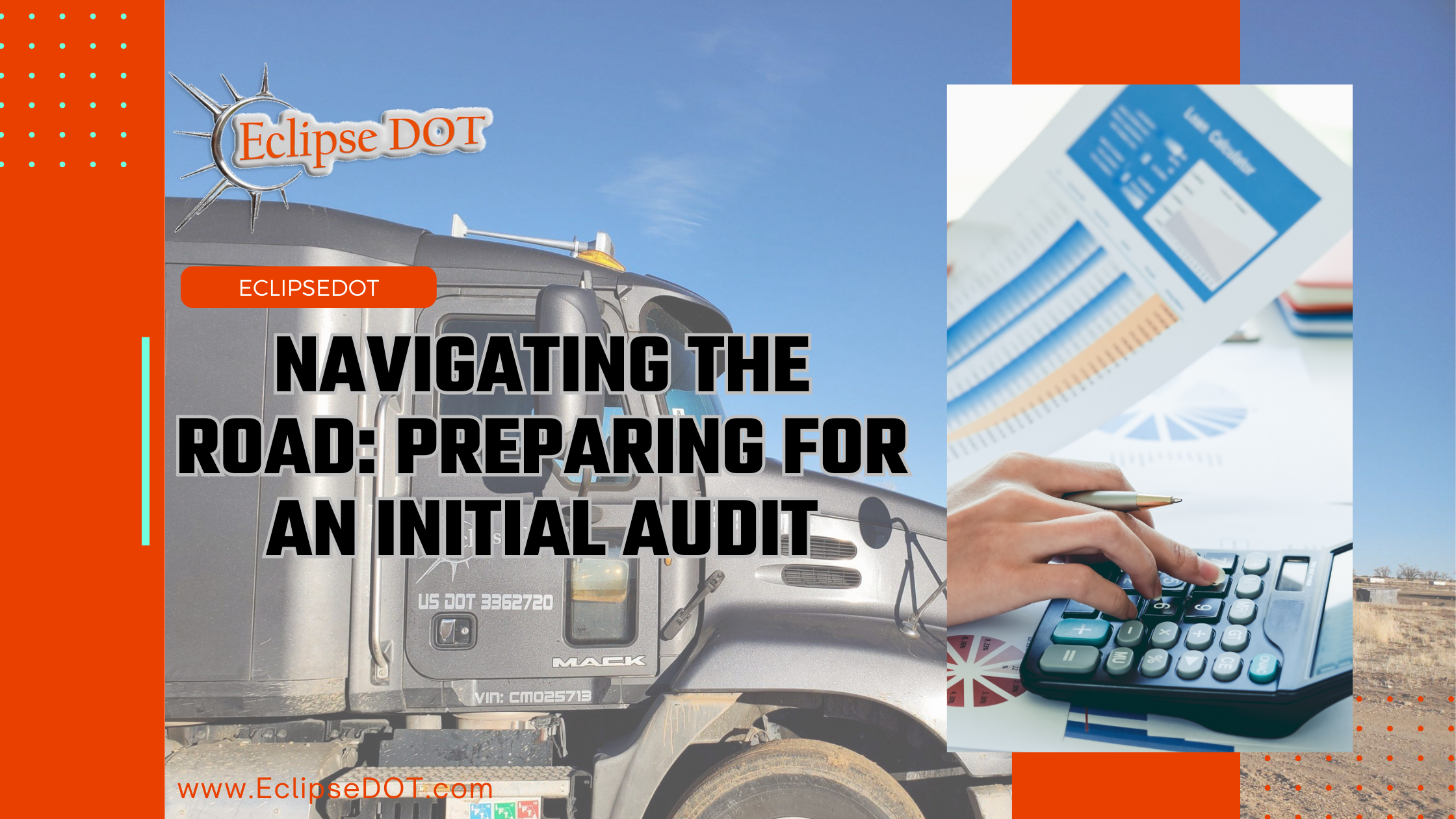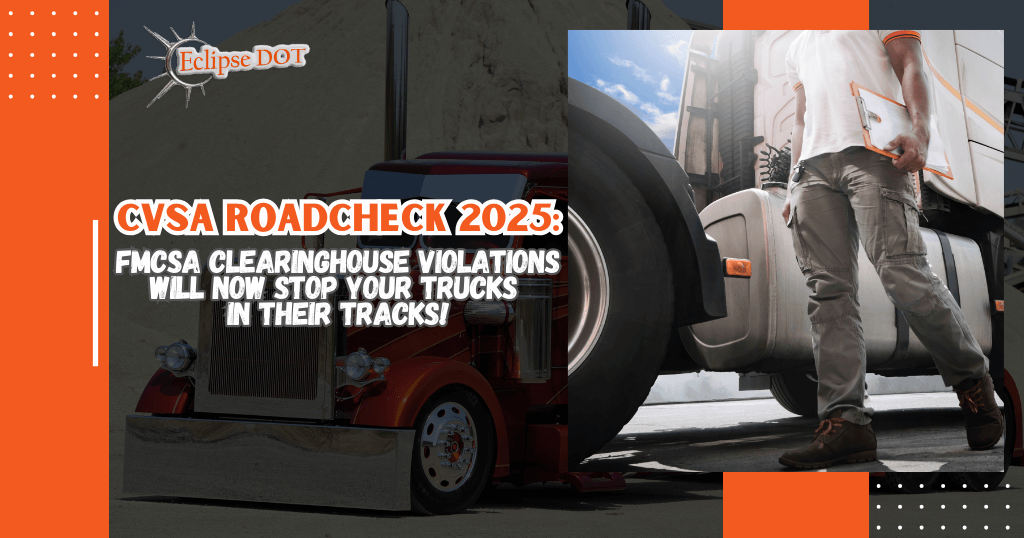Navigating the Road: Preparing for an Initial Audit
Hey everyone, Dan Greer is here! I got an email last week from one of our customers who needed help preparing for an audit. So I figured, you know what? Why don’t I write something up that everyone can use and learn from? I want to prepare you and give you some good insights into preparing for the one thing people in our world hate the most. Audits.
I’m sure you hear the term “DOT audit” often, and it’s got you feeling a bit like a deer in headlights. Well, I’m going to help you prepare for one and fill you in on the ins and outs of preparing for an initial audit. But before we hit the gas, let’s explain what they are.
What are DOT audits?
DOT audits are like those routine check-ups your doctor insists on; they’re conducted by the Federal Motor Carrier Safety Administration (FMCSA) to ensure that US commercial motor carriers and our drivers are playing by the rules. It’s all about keeping the highways safe and sound. After all, as we always mention, safety first, folks!
Audits are important, even if we are faced with them. Audits serve to review a carrier’s compliance with safety regulations, covering a wide array of aspects, including driver qualifications, vehicle maintenance, and safety management practices.
I know we have been talking a ton about regulations. But we’re going to share some more insights. From driver qualifications to vehicle maintenance and everything in between, FMCSA regulations cover a lot of ground. It’s like having a rulebook thicker than your grandma’s holiday cookbook. FMCSA regulations are comprehensive and detailed, addressing various aspects of commercial motor carrier operations to ensure safety and compliance with standards set forth by the administration.
Key Areas Covered by FMCSA Regulations
Knowing the rules of the road is crucial. You wouldn’t play a game without knowing the rules, would you? The same goes for trucking: know the regulations that apply to your operation like the back of your hand. FMCSA regulations encompass key areas such as driver qualifications, hours of service, vehicle maintenance, drug and alcohol testing, and recordkeeping requirements. Each area is critical for maintaining compliance and ensuring the safety of drivers and other road users.
We recently went into detail about hours-of-service regulations and violations, as well as vehicle maintenance regulations and violations and why they’re important. Trust me, you’re going to want to read those if you haven’t already, because they are jam-packed with good tips and insights that you can share with your team.
Importance of Preparation and Benefits of Preparing
If you forget to dot your i’s and cross your t’s, you could find yourself in hot water. We’re talking fines, penalties, and maybe even having your operating authority yanked faster than you can say “logbook.” Non-compliance with FMCSA regulations can lead to significant financial losses and reputational damage, jeopardizing the viability of your business in the long run. I know you’re in business to make money. So why would you jeopardize your revenue stream? My guess is that you wouldn’t. Lol.
Preparation isn’t just about avoiding trouble; it’s about showing the world that you’re serious about safety and compliance. Plus, it’s a whole lot easier to sleep at night when you know you’re in the clear. Being prepared for an audit demonstrates your diligence and commitment to compliance. And that’s why I’m also here—to help give you some knowledge that you can use out in the field.
Every time I write one of these, I always think, Would this have helped me decades ago when I got my start? I would have loved a resource like this. So this is my contribution to you! I want you to succeed and be prepared for an audit. Follow the next steps to get you started.
Steps to Prepare for an Initial Audit
Gather up those papers, folks. You’ll want everything from driver logs to vehicle inspection reports neatly organized and ready for inspection. Think of it as spring cleaning for your paperwork. FMCSA regulations mandate comprehensive documentation of various aspects of operations, including driver records, vehicle maintenance records, and safety management systems, to facilitate audits and ensure compliance.
-
Ensuring driver qualification files are in order
Don’t let those driver qualification files gather dust. Keep ’em up-to-date with all the necessary information, from qualifications to medical certifications. It’s like keeping your glove compartment tidy—you never know when you’ll need something in a pinch. FMCSA regulations stipulate strict requirements for driver qualification files, including driver history records, medical certifications, and licensing documentation, to ensure that only qualified and competent individuals operate commercial motor vehicles. You definitely want to be sure all your files are up-to-date otherwise, you could face some penalties. And I don’t want that to happen to you!
-
Conducting vehicle maintenance checks
A well-maintained vehicle is a happy vehicle. Keep up with those routine maintenance checks, and you’ll be cruising down the highway with peace of mind. Regular vehicle maintenance is not only a legal requirement under FMCSA regulations but also essential for ensuring roadworthiness and preventing accidents caused by mechanical failures. Safety on the road is critical; you know that, and I know that. So it’s best that you conduct regular vehicle maintenance checks regularly so you’re all in the clear.
-
Implementing proper drug and alcohol testing procedures
Stay on the straight and narrow when it comes to drug and alcohol testing. Follow the procedures to a tee, and you’ll avoid any nasty surprises come audit time. FMCSA regulations mandate drug and alcohol testing programs for commercial motor carriers and their drivers to deter substance abuse and ensure safety on the roads. Compliance with testing protocols is essential for maintaining regulatory compliance and safeguarding the well-being of drivers and other road users. If you don’t have a program in place, we can help you with that! Just hit us up if you see anything on this list that you need help with. We are here to help.
-
Familiarizing Yourself with Recordkeeping Requirements
Good record-keeping is the key to a successful audit. Know what you need to keep track of, and keep those records up-to-date and organized. FMCSA regulations require thorough recordkeeping of various operational aspects, including driver logs, vehicle maintenance records, and safety management documentation, to facilitate audits and demonstrate compliance with regulatory requirements. We touch upon this because these are separate from DQ files, so as you know, it’s a tough piece of paperwork but will help you in the long run.
-
Employee training and education
Keep your team in the loop with regular training sessions. It’s the best way to make sure everyone knows the rules of the road. Continuous training and education are essential for ensuring that employees remain knowledgeable about FMCSA regulations, safety procedures, and best practices in the industry. Ongoing training programs help reinforce compliance efforts and promote a culture of safety within the organization. I train drivers frequently and always keep them up to date with what they need to know. If you need someone to help you train your drivers, I’m your guy. Just hit me up on LinkedIn or fill out our contact form, and I’ll help you get started.
-
Ensuring Employees are Aware of Regulations and Procedures
Knowledge is power, folks. Make sure your employees know the ins and outs of FMCSA regulations; it’s the best way to keep everyone on the same page. Providing comprehensive training on FMCSA regulations and compliance procedures ensures that employees understand their responsibilities and obligations, reducing the likelihood of violations and improving overall safety and compliance performance. We have a ton of resources that you can check out.
-
Utilizing technology for compliance
Say goodbye to those old-school logbooks. ELDs make tracking hours of service a breeze. Plus, they’ll keep you on the right side of the law. Electronic logging devices (ELDs) offer numerous benefits for compliance with FMCSA regulations, including accurate recording of driver hours of service, automated log auditing, and improved data accuracy. By implementing ELDs, carriers can streamline compliance efforts and reduce the risk of violations related to hours-of-service regulations. By the way, we can help you with these too. Just let me know how I can help.
By following these seven steps, you can better prepare for your audit. I always say it’s better to be prepared than to not know what’s going to hit you. These are all very important things to know and be aware of. You should also be regularly doing internal audits. These will help you safeguard your drivers and your company.
Don’t wait for the feds to come knocking; conduct regular internal audits to stay ahead of the game. Internal audits are proactive measures undertaken by carriers to assess compliance with FMCSA regulations and identify areas for improvement. Regular audits help identify potential issues early on, allowing carriers to take corrective action and maintain a high level of compliance with regulatory requirements.
As always, we hope you got a lot of good information out of this article. Don’t hesitate to reach out to us if you need help preparing for an initial audit. I’ve got you covered! I can help you with DQ files, vehicle maintenance records, driver training, and more. So please reach out!
Discover our CDL & DOT Compliance articles for an exclusive trial at DOTDocs.com. Also, claim your FREE micro audit at THE ECLIPSE DOT MICRO AUDIT. Ready for smoother operations?







One thought on “Navigating the Road: Preparing For An Initial Audit”
Fine news for all us